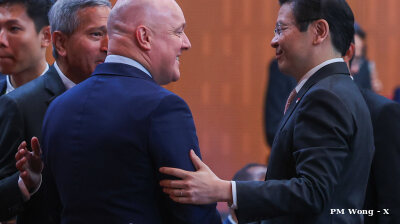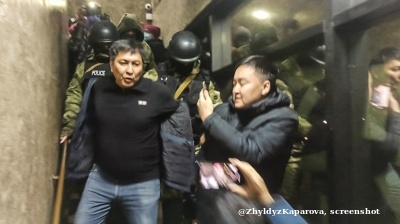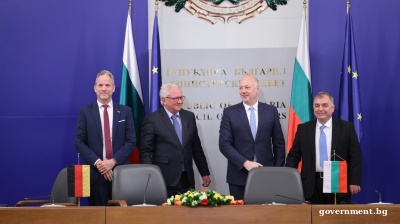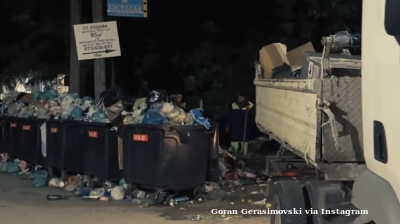The newly elected speaker of the Macedonian parliament, Talat Xhaferi, has sent a letter to President Gjorge Ivanov to officially inform him of the new majority in the parliament. The letter was sent in the expectation that the president will give a mandate to the Social Democratic Union of Macedonia (SDSM) leader to form a government, Xhaferi said.
Ivanov, according to the constitution, should respond within ten days. So far, he has refused to give a mandate to SDSM leader Zoran Zaev, citing Zaev’s coalition with three ethnic Albanian parties which are seeking greater rights for Macedonia’s Albanian minority as a condition for backing his government. Ivanov is close to to VMRO-DPMNE, which has ruled Macedonia since 2006 and has resolutely tried to prevent a handover of power to the SDSM.
“Now, the president of the assembly expects President Gjorge Ivanov to act according to the constitution,” Xhaferi’s office said in a statement, after the letter was sent to Ivanov.
Xhaferi took up the position of speaker a day earlier after being temporarily prevented by lawmakers from the SDSM's bitter rival, the conservative VMRO-DPMNE party.
Xhaferi, an MP from the ethnic Albanian Democratic Union for Integration (DUI), was elected on April 27 in an unconventional procedure in the middle of the parliament hall, as MPs from VMRO-DPMNE tried to prevent his election. This sparked violent incidents in the parliament which left over 100 people injured, including Zaev.
On May 4, Xhaferi also paid his first official visit to Brussels, after being invited by EU senior representatives, the parliament said in a separate statement.
His agenda included meetings with EU Enlargement Commissioner Johannes Hahn and EU foreign policy and security chief, Federica Mogherini.
Xhaferi was expected to reaffirm Macedonia’s determination to become a full member of the European Union.
The invitation is a sign that Xhaferi is recognised as a legitimate speaker of the parliament by the EU, even though VMRO-DPMNE has contested his election.
Zaev expects the government to be formed by the end of May, his party said in a statement on May 4.
“But this will depend on Ivanov’s decision to give the mandate,” Zaev noted.
According to Zaev, the new government should be formed as soon as possible to enable normal functioning of Macedonian institutions in the interest of all citizens.
If Zaev is given the mandate by Ivanov, his government would have to be approved by the parliament. The SDSM and three ethnic Albanian parties have a majority of 67 MPs in the 120-seat assembly. VMRO-DPMNE has 51 seats.
However, it is still not clear how the process will unfold due to VMRO-DPMNE’s reluctance to leave power and due to the fragile political climate in the country following the April 27 incidents.
VMRO-DPMNE actually won the December 11 election, gaining two more seats than the SDSM, but failed to form a government with its old partner, the DUI. The sticking point was reportedly the platform drawn up by the DUI and other ethnic Albanian parties, which they set as a condition for backing any new government.
The platform sparked mass protests due to the fears that it could destabilise the country, and result in it being federalised. Many Macedonians fear it will be a prelude for the implementation of plans for “Greater Albania”, a political concept of an Albanian state encompassing parts of neighbouring countries, including Macedonia, where ethnic Albanians are a majority.
In the meantime, Serbian media reported on May 3 that the country’s military-security services seized a huge quantity of weapons in the south of Serbia, that were being illegally transported to Macedonia.
Army sources quoted by Serbian daily Blic said the weapons were assumed to be intended for ethnic Albanian parties in Macedonia. The weapons were apparently intended to inflame the conflict in Macedonia or to provoke other incidents, Blic said.
According to the sources, several thousand rifles, machine guns, mortars and hand grenades, were seized last week near Presevo and Bujanovac, near the border with Kosovo and Macedonia.
Both Serbia and Macedonia have troubled relationships with their ethnic Albanian minorities. Serbia still claims that Kosovo - which unilaterally declared its independence in 2008 - is part of its territory, while Skopje is under pressure to give more rights to the country’s ethnic Albanian minority, which comprises about one quarter of the population.
News

Singapore PM Lawrence Wong heads to APEC in bid to deepen Seoul ties
The visit will be Wong’s first trip to South Korea since he assumed office in May 2024, and the first by a Singaporean prime minister since 2019 – in part to recognise the 50th anniversary of diplomatic relations between the two nations.

US–South Korea investment deal on ice – for now
After a triumphant round of investment pledges in Tokyo, Donald Trump’s state visit to South Korea presents a far more challenging negotiation.

Kyrgyzstan bans three media titles as “extremist organisations”
Populist-nationalist president Sadyr Japarov, due to meet Donald Trump next week, denies introducing authoritarian controls.

Lula says Trump assured him of trade accord as US explores Brazil rare earths ties
Brazilian President Lula voiced optimism that his country will secure a trade agreement with the US following talks with President Trump, as Washington simultaneously stepped up engagement with Brazilian mining executives to discuss rare earths.




